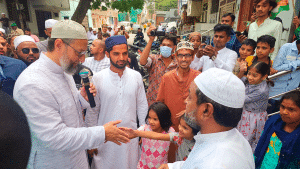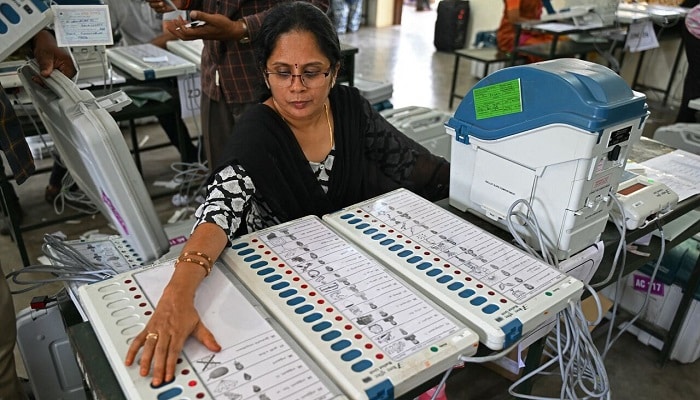PNN – The fourth phase of India’s House of Commons elections has reached the southern capital of Hyderabad and the center of opposition to the ruling party in West Bengal, where Muslims have held power in recent years, and looking at the margins of recent days, the competition has intensified.
According to the report of Pakistan News Network, the fourth phase of India’s several-week election began on May 13, and the people of nine other states and regions will go to the polls to elect 96 members of parliament for the “Lok Sabha” or House of Commons.
In the third phase of voting, Narendra Modi cast his vote in Gujarat, and the flamboyant speeches of the ruling party of India (Bhartiya Janta/BJP) intensified the competition between them and the Congress party and their 26-party coalition.
In the first three phases of the elections, which were held on April 19, April 26 and May 7, the Indian people participated in 66.1, 66.7 and 61% respectively. The number of votes cast so far is lower than in the 2019 elections, with a total of 969 million people registered to vote in 543 parliamentary constituencies in 36 states and territories of India.
More than 177 million voters are eligible to vote in the fourth phase of the election, and the Election Commission has announced that voting from home is also possible for this phase.
Registered voters in nine states and one territory of India will cast their ballots for the following constituencies:
All constituencies in the states of Andhra Pradesh, Telangana and other states; Jharkhand: four constituencies out of 14 constituencies, Orissa: four out of 21 constituencies, Uttar Pradesh: thirteen out of 80 constituencies, Madhya Pradesh: eight out of 29 constituencies, Bihar: five out of 40 constituencies, Maharashtra: eleven out of 48 constituencies, West Bengal: eight out of 42 constituencies, Jammu and Kashmir: one of the five constituencies, namely Srinagar, which is one of the most important voting districts after the cancellation of the special status in this region.
In Hyderabad, the capital of Telangana state in the heart of India, Asaduddin Owaisi enters the electoral field in the family stronghold. His brother, Akbaruddin Owaisi, is a member of the state legislature while his father, Sultan Salahuddin Owaisi, was a six-time representative of the Hyderabad parliamentary constituency with a significant Muslim population. Owaisi has presented himself as the voice of India’s Muslim minority who raises the issues of this community in his parliamentary debates. Owaisi received the “Best Member of Parliament” award in 2022.

Srinagar in Jammu and Kashmir is an important region in this election, in this constituency in Kashmir in the 2019 elections, only 15% of eligible voters voted and boycotted the elections. This is the first parliamentary election in Kashmir since the special status of the region was revoked in August 2019. The two main parties in the region, the National Conference and the People’s Democratic Party, are allies of the 26-party coalition of the Congress Party, and both have nominated Muslim candidates to the voters.
West Bengal is also important in this phase of elections. Addressing the ruling party in the state, the Trinmol Congress (TMC) led by Mamata Banerjee, one of the most powerful women in Indian politics, the Indian Prime Minister said they destroyed Bengal and destroyed homes. In this district, Yusuf Pathan, a former Indian cricketer, is running against an ally from the Congress Party, both of whom are members of Modi’s opposition coalition.
Another seat that has attracted a lot of attention is located in Uttar Pradesh. India’s controversial deputy home minister Ajay Mishra Teni is seeking re-election but has come under fire since his son Ashish Mishra drove his car over farmers protesting the now-repealed farm rules. Ashish has been released on bail, but farmers’ groups as well as social activists have demanded that the BJP and the Election Commission disqualify Mishra.
Voting will start at 7:00 am local time (01:30 GMT) and will end at 18:30 (12:30 GMT).
The first three phases of the Lok Sabha elections have determined the fate of 284 members of the Indian House of Commons.
So far, voting for all seats in Tamil Nadu, Kerala, Meghalaya, Assam, Manipur, Karnataka, Mizoram, Arunachal Pradesh, Nagaland, Uttarakhand, Chhattisgarh, Goa, Gujarat, Rajasthan, Sikkim and Tripura, Andaman and Nicobar Islands and the state territories of Dadra and Nagar Haveli, Daman, Diu, Lakshadweep and Puducherry have been completed.
Voting in the general elections of the House of Commons of India known as Lok Sabha has started on April 19.
India’s Prime Minister Narendra Modi’s Bharatiya Janata Party (BJP) hopes to win the necessary parliamentary majority. At the same time, criticisms about the weakening of democracy in India have increased since this party came to power in the last 10 years.
With over 969 million eligible voters representing over 10% of the world’s population, Indian elections are the largest democratic exercise in the world.
The candidates of this election are competing for 543 seats in seven stages and counting of votes will be done on June 4 after voting on April 19, April 26, May 7, May 13, May 20, May 25 and June 1.
The voting age is 18 years and candidates must be at least 25 years old.

